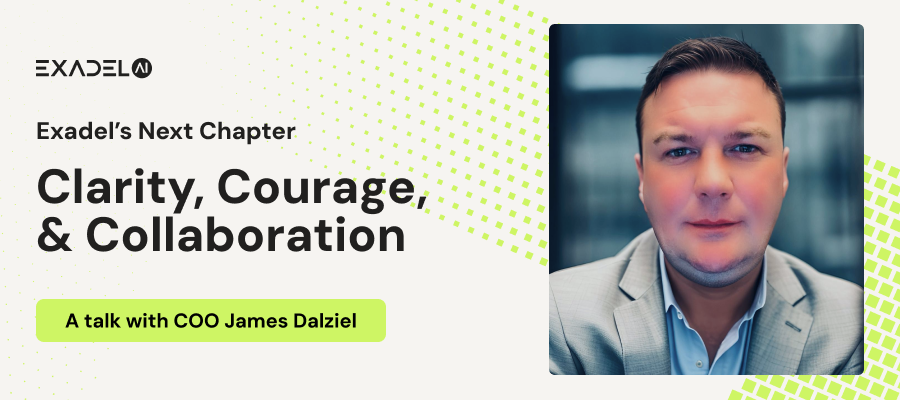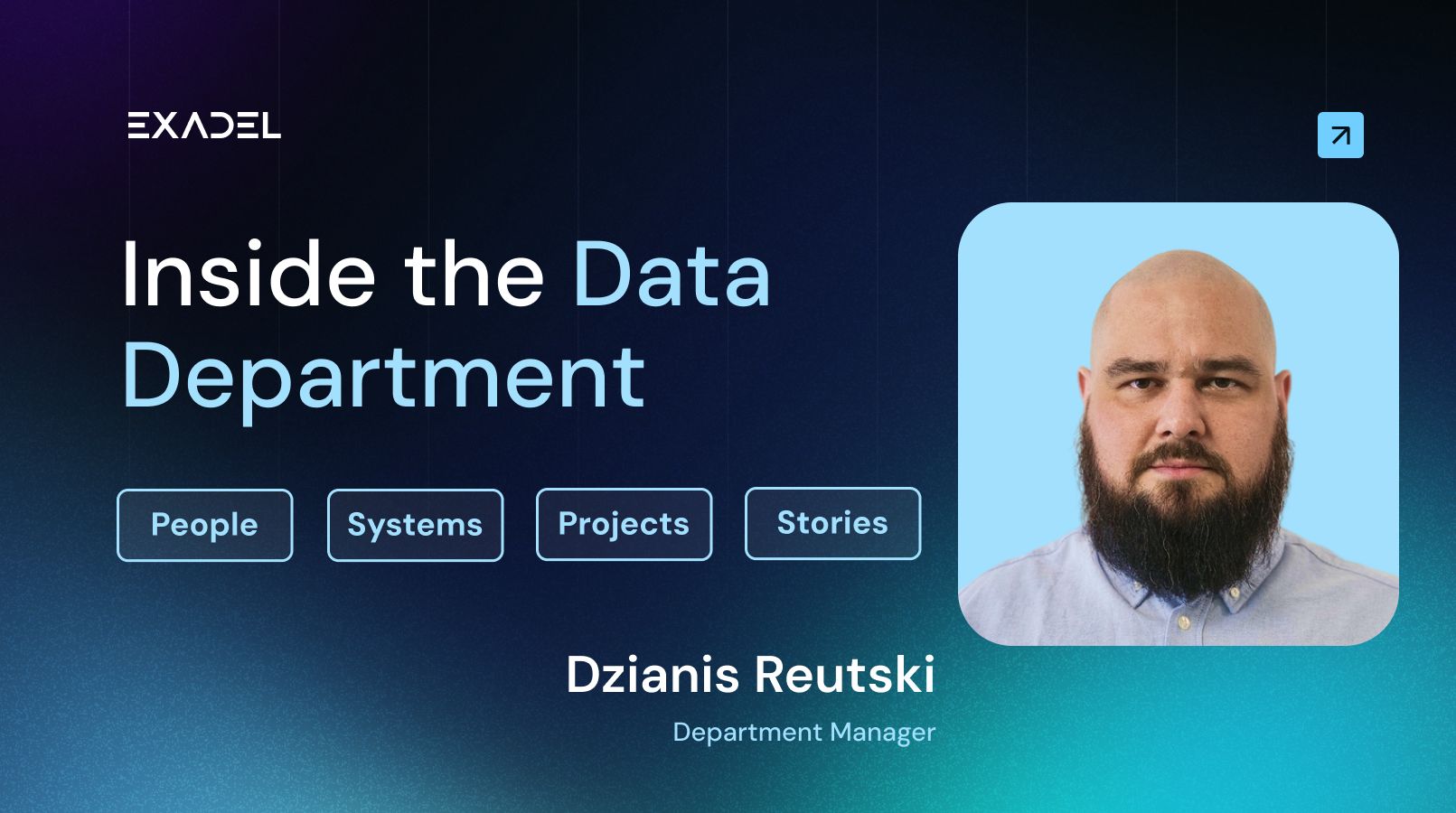Table of Contents
Tags
Share
“C-Talks” is our new interview series designed to bring you closer to the people shaping Exadel’s strategy and culture. First up in our pilot episode: a talk with James Dalziel, Exadel Global Chief Operating Officer. From leading international teams to finding focus at 5 a.m., James shares how clarity, collaboration, and an AI-first mindset are helping drive Exadel’s next chapter.
How do you usually kick off your work day?
J: I usually work from home and balance my workday around my children. I’m an early riser — I get up at five, grab a coffee, and take my iPad to the garden, where I spend about an hour catching up on emails. After that quiet start, I head back inside to get the kids’ breakfast ready, organize their school uniforms, and take them to school. Once they’re dropped off, I dive straight into work and typically stay at it until around eight or nine in the evening — that’s a fairly typical day for me when I’m not traveling.
It’s definitely a full and busy day, but I really value those early hours. That peaceful, quiet time at 5 AM is when I do most of my strategic thinking — when the phone isn’t ringing and I can reflect on the company, the people, and the challenges ahead. That’s when I can focus on finding the right approach to difficult or complex problems. By the end of the day, I tend to run out of steam, so mornings are definitely when I’m at my best.
What’s one thing that’s always on your desk?
J: I just looked at it the other day and thought to myself, why is this thing still here? It’s an old-fashioned calculator, which I have used for 25 years already. I had it the last time I worked with Micheal too. I’m very proud of it and it has been faithful to me. I actually use it daily, and do all my forecasting and math stuff on it. Old-fashioned, but it never let me down. It’s trusted, and takes a proud place on my desk.
How would you describe your leadership style?
J: I would say I’m pretty direct. I aim to be clear and not leave anything ambiguous. I want people to understand how their role is connected to what I’m asking, and the direct impact that they can have through the action that we discussed.
So I’m very open. My immediate team can contact me any time, and anybody in the organization can also reach me easily. In fact, I encourage employees to do that, especially giving our many remote workers and global offices. Communication is key. I don’t want to wait for an employee engagement survey to find out about people’s concerns or issues, or be in a situation where some have great ideas and are unable to forward them to us. I want to create an opportunity where everyone’s voice can be heard, and everyone sitting in a leadership role ought to adopt this management style of openness and transparency. This is how we ensure that the leadership understands the real “heartbeat” of the organisation.
What qualities do you value in your team?
J: I’m very lucky to have a really great leadership team. They are experienced, exceptional, and they’re good communicators, seeking clarity and action. And that’s what I want. If you find a problem, let’s find out what the problem is. Let’s get it fixed and move it forward. I think you’ll experience that with any one of my direct reports, or any one of the leadership team, we believe there is always a solution worth thinking of.
I never want my team to use the term no, because there’s always an answer. And the quicker we get to it, the better. I value and encourage progress over perfection. It’s easy to sit and plan and plan and plan, but it’s real action that matters. I learnt this lesson during my time at Samsung, where they said: it’s not 356 days of planning and one day of execution, it’s one day of planning and 356 days of execution. This is the mindset we need to get in, which is that it doesn’t have to be perfect; it just has to be progressive.
People will make mistakes, I’ll make mistakes, we’ll all make mistakes at some point. Own them, be honest about them, and we’ll get past them. It doesn’t have to be perfect. Progress over perfection, always.
Can you give us a summary of the next steps for Exadel?
J: I think there are many reasons to be excited. I feel that after many changes in recent years, Exadel has reached a point of stability. I’m quite confident in the leadership vision for the organization and expansion plans. Now, after transitioning to an AI-first company, we are building strong excellence centres and clear career paths for all employees across the organization. There are a lot of new things coming.
We want to put special emphasis on our employees and their understanding of where they fit in the big vision. This means bringing visibility to our board actions and ensuring each actively uses their talents. We have many talented individuals in the organization, and people are always the backbone of any world-class engine. We’re not only investing in their growth, but also in the growth of specific locations. Having one of the most talented engineers on the market, we are much more nimble than some larger players. It allows us to make faster decisions and become much more entrepreneurial in the way we solve client challenges. I’m certain that the recipe we’ve got is pretty exciting.
And finally, what would you define as business success?
J: That’s easy. From my point of view, business success means the top line stays growing and in double digits, while the attrition goes down as everyone has a career path clearly connected to the goal. This means we are bringing in new talented engineers, excited for the upcoming projects. Every function in the organization grows systematically. This is what I call brain gain, as opposed to brain drain. And of course, happy customers that don’t churn.
I often recall the words of one wise Chairman that I worked with on one of the Private Equity Portfolio Companies. He taught me many things, but there’s a particular piece of advice that stuck out to me. Lead with clarity, openness and honesty, because as a leader, you’re only as good as the people that surround you. Business success comes from clearly defined expectations, investing in people and their career development – you can’t do it alone, and you need to move forward as a unit.
Author: Exadel Recruitment Team









